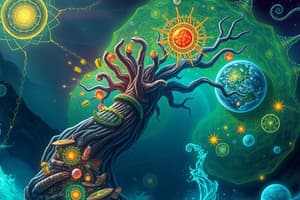Podcast
Questions and Answers
How are organisms classified into domains and kingdoms?
How are organisms classified into domains and kingdoms?
Organisms are classified into a three-domain system of classification: Bacteria, Archaea, and Eukarya, based on their cell type, their ability to make food, and the number of cells in their bodies.
What is Domain Bacteria?
What is Domain Bacteria?
Bacteria can be anywhere, some are autotrophs, some are heterotrophs, and all bacteria are unicellular prokaryotes.
What are prokaryotes?
What are prokaryotes?
Prokaryotes are unicellular organisms whose cells lack a nucleus.
What is a nucleus?
What is a nucleus?
What characterizes Domain Archaea?
What characterizes Domain Archaea?
What is Domain Eukarya?
What is Domain Eukarya?
What are eukaryotes?
What are eukaryotes?
What are protists?
What are protists?
What distinguishes fungi?
What distinguishes fungi?
What are the characteristics of plants?
What are the characteristics of plants?
What defines animals?
What defines animals?
Flashcards are hidden until you start studying
Study Notes
Classification of Organisms
- Organisms are categorized using a three-domain system: Bacteria, Archaea, and Eukarya.
- Classification is based on cell type, method of obtaining food, and number of cells.
Domain Bacteria
- Bacteria inhabit diverse environments.
- Autotrophic and heterotrophic forms exist.
- All bacteria are unicellular prokaryotes.
Prokaryotes
- Prokaryotes are unicellular organisms lacking a nucleus.
- Nucleic acids are not contained within any membrane-bound structure.
Nucleus
- The nucleus is a dense area within cells that holds nucleic acids, directing cell activity.
Domain Archaea
- Archaea thrive in extreme environments, such as hot springs, ocean floors, and volcanic regions.
- They are also unicellular prokaryotes, varying between autotrophs and heterotrophs.
- Distinct from bacteria due to differences in chemical composition and cell structure.
Domain Eukarya
- Organisms in Eukarya are classified into four kingdoms: protists, fungi, plants, and animals.
Eukaryotes
- Eukaryotes possess cells that contain a nucleus.
Kingdom Protists
- Protists are diverse eukaryotic organisms not fitting into fungi, plants, or animals.
- Commonly referred to as the "odds and ends" kingdom due to their variability.
- Members can be autotrophic or heterotrophic and include both unicellular and multicellular forms.
Kingdom Fungi
- Fungi encompass organisms like mushrooms, molds, and mildew.
- They can be unicellular or multicellular and are all heterotrophic.
- Nutrients are absorbed from dead and decaying organisms.
Kingdom Plants
- All plants are multicellular and autotrophic, producing their own food.
- They provide essential food sources for various terrestrial heterotrophs.
- Plant diversity includes variations in height and whether they produce flowers.
Kingdom Animals
- All animals are multicellular and heterotrophic.
- Animals display various adaptations for locating, capturing, consuming, and digesting food.
- They inhabit numerous environments, showcasing ecological diversity.
Studying That Suits You
Use AI to generate personalized quizzes and flashcards to suit your learning preferences.




